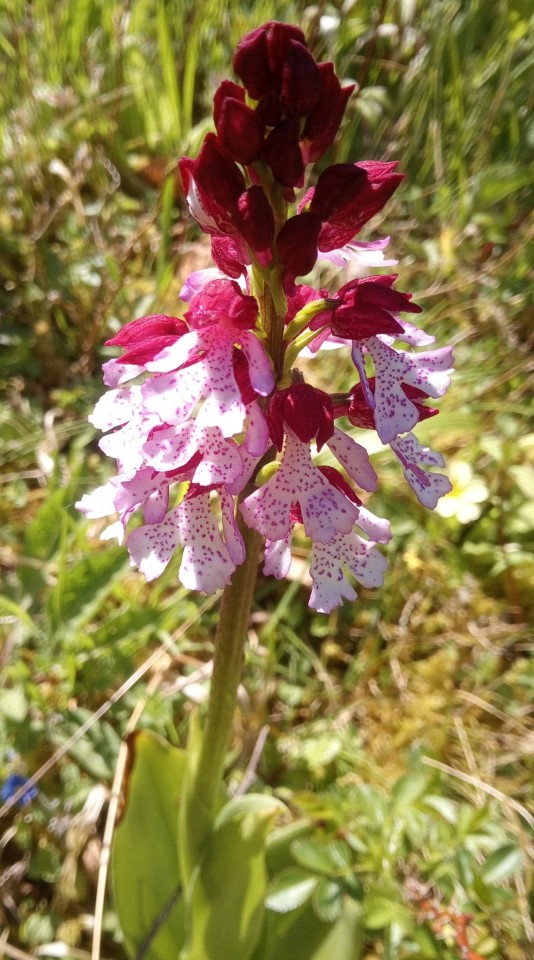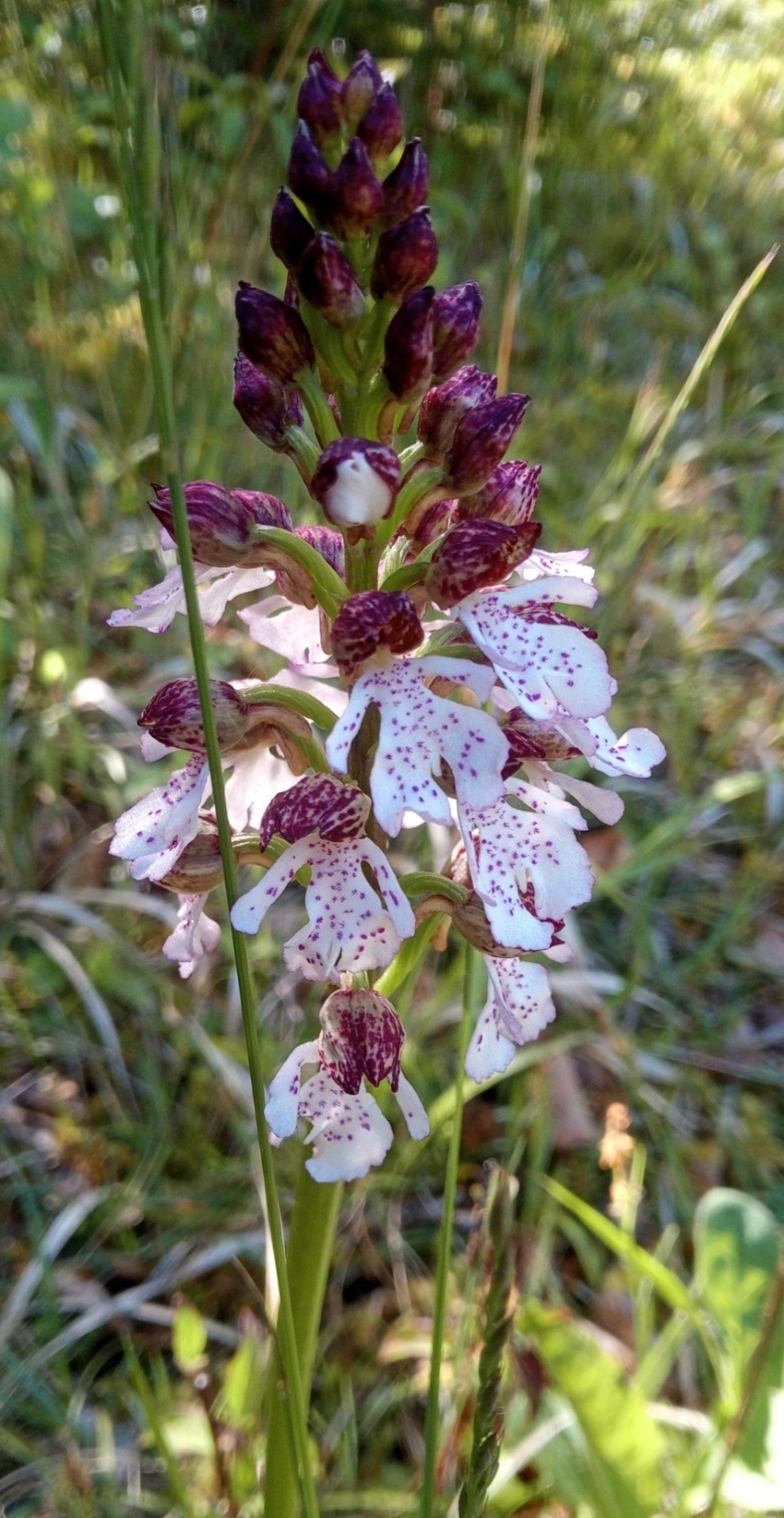Is This Partial Albinism? A Few Years Back I Saw A Blackbird (common Name) With A Lot Of White Feathers
Is this partial albinism? A few years back I saw a blackbird (common name) with a lot of white feathers (see my picture below) and a quick internet search suggested partial albinism as the reason for this. However a more recent search suggested that partial albinism was not a thing and other genetic mutations are at play.

Does anyone have any insight on this?

Rare white puffin spotted on Scottish island
The Scottish Wildlife Trust (SWT) said the bird was first seen on Handa Island in mid-June by seabird fieldworker Dora Hamilton.
Photographer: Dora Hamilton

More Posts from Pictures-and-things-321 and Others

Some wild fungi photos that I have taken this autumn. It always amazes me how quickly the fruiting bodies develop and the immense diversity of forms and colors that they can take.
I will probably be using this account to store photos that I have taken so I can use them later on, for work or in my art. Hopefully others will find them interesting or useful as well. I will avoid posting my art and other unrelated posts here.
The top one is the cap of a fly-agaric (a fairytale toadstool). I don’t know what species the others are but they were all photographed in the southeast of the UK.


I was wearing the lichen themed hair clip I made, while on a walk yesterday. I spotted some beautiful lichen and moss and decided to have an impromptu photo shoot. So here are a whole bunch of pictures of my hair clip alongside the organisms that inspired it, just because.




Plus 2 bonus pictures of lichen because I love it.


Backgrounds and geographical structures are things I, currently can't, but would really like to be able to draw/depict. and these are rendered so beautifully that I am saving it for inspirational purposes





Art by Gui Yuan
I went fossil hunting down at the Warren (in Folkestone, Kent, UK) on Thursday last week. These are some of my favourite finds from the trip (I washed them up at home).


Fossil hunting is great fun. If you live in the UK, and fancy giving it a shot, then there are some really handy websites that you should check out. https://ukfossils.co.uk/ and http://www.discoveringfossils.co.uk/fossil-locations-of-great-britain/
If you don't live in the UK but still want to give it a go then I would recommend looking for local fossil hunting clubs, societies and websites. Failing that you should try to look for areas where sedimentary rocks are being eroded. For instance, cliffs by the sea, rivers, old quarries, etc.
Just make sure you don't trespass or go anywhere too dangerous. For instance, if you are fossil hunting under cliffs at the beach, don't get to close to the cliffs (falling debris and cliffs collapsing) and plan around the tides (you don't want to get cut off).



My attempt at Smaugust 2024. Though I am randomly selecting prompts from multiple lists.
The first prompt shown is for fungi.
The second prompt is for amphibian.
The third prompt was venomous. I combined an adder which is my country's only native venomous snake with a Hoopoe bird which has a symbiotic relationship with a bacteria which produces noxious chemicals.
Some work acquaintances asked me to make them a butterfly hair clip after they helped me with an open day.




The first requested one based on a large emerald moth and the second asked for a peacock butterfly.
I am quite pleased with them so I thought I would share how they are made on the off chance that someone else wants to give it a go.
What you need:
- Denim or other suitably thick fabric from unwearable old clothes
- PVA glue
- acrylic paint
- embroidery hoop (optional but helps keep fabric flat)
- paper + tracing paper + pencil + scissors
- hot glue
- French barrette hair clip (alternatively you could stick it to a fridge magnet or something else)
How to make:
1. Prep the fabric by cutting a section, securing it in the hoop, then painting it first with PVA then with two layers of white acrylic paint (letting it dry between each application)
2. Find reference photos of desired species, preferably with wide open wings and taken from above.
3. Sketch half of the moth or butterfly onto a piece of paper.
4. Trace each wing separately on to the tracing paper and transfer to the fabric. Then flip and do this again so the wings are mirrored. Also do this for the body
5. Paint with acrylic paint.
6. Cut out and assemble with hot glue.
7. Stick it on to the hair clip (or other item) with hot glue
If you do make one, I would love to see them.
Today I visited the Ossuary in Hythe, Kent, UK with my parents. It was absolutely fascinating and well worth the visit if you are interested in local history (£3 adult entry).










You find yourself wondering about the lives they all lead and who they might have been. Hopefully they are all in a better place regardless.
It is no doubt due to angle and lighting but they all look like they have distinctive personalities and expressions if that makes sense.

A few more doodles for smaugust 2024. Not following any prompts, just trying to get back into doodling more frequently again.





A short clip from the safari at Port Lympne zoo as well as some pretty little common twayblade orchids that were growing there















I went along to a guided walk at Denge Wood near Canterbury (Kent, UK). The walk was run by butterfly conservation and we got to see some amazing butterflies, moths, orchids and lizards.
Including the Duke of burgundy butterfly, the green hairstreak butterfly, the dingy skipper, brimstones, orange tip butterflies, lady orchids, early purple orchids and twayblade orchids.
Unfortunately my camera is being mended so I had to take photos on my phone. But you can at least get an idea of how pretty they all are.
I would strongly recommend a visit if you are in the area and I recommend checking out the butterfly conservation website for local walks if you live in the UK as they are free and very informative.
-
 low-level--00 reblogged this · 11 months ago
low-level--00 reblogged this · 11 months ago -
 low-level--00 liked this · 11 months ago
low-level--00 liked this · 11 months ago -
 starrymochas reblogged this · 1 year ago
starrymochas reblogged this · 1 year ago -
 techycatartist reblogged this · 1 year ago
techycatartist reblogged this · 1 year ago -
 techycatartist liked this · 1 year ago
techycatartist liked this · 1 year ago -
 neothebean reblogged this · 1 year ago
neothebean reblogged this · 1 year ago -
 folio-sprout reblogged this · 1 year ago
folio-sprout reblogged this · 1 year ago -
 folio-sprout liked this · 1 year ago
folio-sprout liked this · 1 year ago -
 argentleif reblogged this · 1 year ago
argentleif reblogged this · 1 year ago -
 argentleif liked this · 1 year ago
argentleif liked this · 1 year ago -
 fuzzysherbet reblogged this · 1 year ago
fuzzysherbet reblogged this · 1 year ago -
 superfaggot reblogged this · 1 year ago
superfaggot reblogged this · 1 year ago -
 superfaggot liked this · 1 year ago
superfaggot liked this · 1 year ago -
 snowgyr liked this · 1 year ago
snowgyr liked this · 1 year ago -
 pigeonquincey reblogged this · 1 year ago
pigeonquincey reblogged this · 1 year ago -
 pigeonquincey liked this · 1 year ago
pigeonquincey liked this · 1 year ago -
 pepolii reblogged this · 1 year ago
pepolii reblogged this · 1 year ago -
 steepsheep reblogged this · 1 year ago
steepsheep reblogged this · 1 year ago -
 astarlingdiscovery reblogged this · 1 year ago
astarlingdiscovery reblogged this · 1 year ago -
 symphonyincoordination liked this · 1 year ago
symphonyincoordination liked this · 1 year ago -
 unstablefingerprint liked this · 1 year ago
unstablefingerprint liked this · 1 year ago -
 ltc-henry-blake reblogged this · 1 year ago
ltc-henry-blake reblogged this · 1 year ago -
 magisterhego reblogged this · 1 year ago
magisterhego reblogged this · 1 year ago -
 thecatandthemoon liked this · 1 year ago
thecatandthemoon liked this · 1 year ago -
 asterwildalso reblogged this · 1 year ago
asterwildalso reblogged this · 1 year ago -
 voidbunnynura liked this · 1 year ago
voidbunnynura liked this · 1 year ago -
 taxibirds reblogged this · 1 year ago
taxibirds reblogged this · 1 year ago -
 dessertroose liked this · 1 year ago
dessertroose liked this · 1 year ago -
 dharr5 liked this · 1 year ago
dharr5 liked this · 1 year ago -
 peppermint-friedelite liked this · 1 year ago
peppermint-friedelite liked this · 1 year ago -
 fangornfolk liked this · 1 year ago
fangornfolk liked this · 1 year ago -
 kiwi-shizz reblogged this · 1 year ago
kiwi-shizz reblogged this · 1 year ago -
 taxibirds liked this · 1 year ago
taxibirds liked this · 1 year ago -
 feathersandscales3 reblogged this · 2 years ago
feathersandscales3 reblogged this · 2 years ago -
 eyesofaniris liked this · 2 years ago
eyesofaniris liked this · 2 years ago -
 cocktail-party-in-an-abattoir reblogged this · 2 years ago
cocktail-party-in-an-abattoir reblogged this · 2 years ago -
 thefruitthatgodforgot reblogged this · 2 years ago
thefruitthatgodforgot reblogged this · 2 years ago -
 cocktail-party-in-an-abattoir liked this · 2 years ago
cocktail-party-in-an-abattoir liked this · 2 years ago -
 teratocore liked this · 2 years ago
teratocore liked this · 2 years ago -
 overthinkinks reblogged this · 2 years ago
overthinkinks reblogged this · 2 years ago -
 toosmallortootall reblogged this · 2 years ago
toosmallortootall reblogged this · 2 years ago -
 bobthedragon liked this · 2 years ago
bobthedragon liked this · 2 years ago -
 shinkei-shinto reblogged this · 2 years ago
shinkei-shinto reblogged this · 2 years ago -
 nucleardna liked this · 2 years ago
nucleardna liked this · 2 years ago -
 alcibiades-hacks-it reblogged this · 2 years ago
alcibiades-hacks-it reblogged this · 2 years ago -
 alcibiades-hacks-it liked this · 2 years ago
alcibiades-hacks-it liked this · 2 years ago -
 cuddlyandwarm reblogged this · 2 years ago
cuddlyandwarm reblogged this · 2 years ago -
 laymedowninsheetsoflinen liked this · 2 years ago
laymedowninsheetsoflinen liked this · 2 years ago -
 charlythelee liked this · 2 years ago
charlythelee liked this · 2 years ago

Hello, I love plants, animals (particularly insects), art, craft, animation and other random stuff like creature design and sci-fi. My pronouns are she/her and I am aro/ace.
29 posts